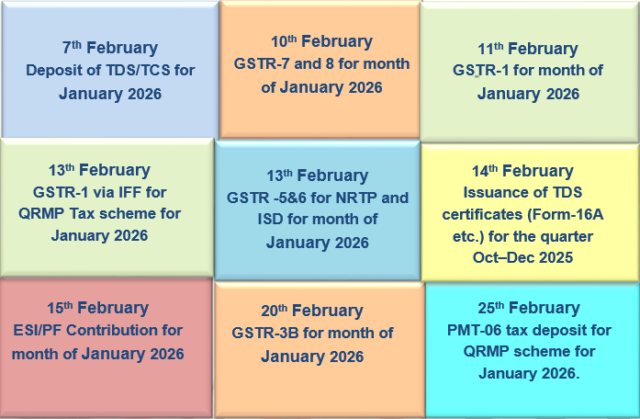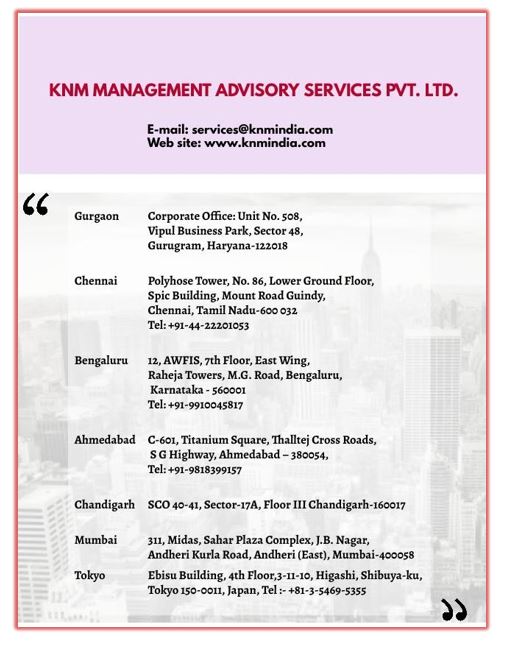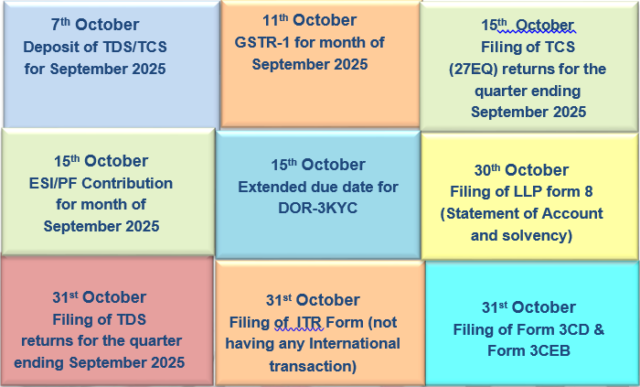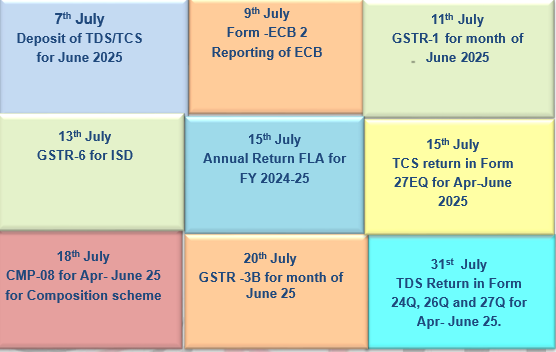
Executive Summary
Income Tax
- SECTION 10(23EE) – Exemption – Core Settlement Guarantee Fund
- Introduction of Budget 2026
Goods And Service Tax (GST)
- Notification no. 19/2025 – Section 9 of the Central Goods and Services Tax Act, 2017 – levy and collection of tax – CGST rate schedule for goods – amendment in notification no. 9/2025 Central Tax (Rate) [F. No. Cbic-190349/73/2025 – tru], Dated 31-12-2025
- Notification no. 19/2025 – Section 15 of the Central Goods and Services Tax Act, 2017 – value of taxable supply – notified supplies value of which to be determined in such manner as may be notified by government on recommendations of council – amendment in Notification No. 49/2023 Central Tax [G.S.R. 949(e)/F. No. CBIC – 20001/2/2025 – GST], Dated 31-12-2025
- Notification no. 20/2025 – Central Goods and Services Tax (fifth amendment) rules, 2025 – amendment in rule 86b and insertion of rule 31d Central Tax [G.S.R. 950(e)/F.No. CBIC-20001/2/2025 – GST], Dated 31-12-2025
- Press release, CBIC extends export incentives to postal shipments from 15-1-2026 – incentives expected to significantly enhance competitiveness of MSME exporters, especially from smaller towns and remote areas, and give a major fillip to postal exports, Dated 16-01-2026
Companies Act 2013/ Other Laws
- Director KYC Relaxation
- Deferral of New Regional Director Jurisdiction Structure
- Small Company Status Display in Master Data
- Amendments to SEBI (LODR) for High Value Debt Listed Entities
- New FEMA Regulation on Guarantees (Effective January 6, 2026)
- RBI Update to FEMA Reporting Master Direction
- Revised liquidation regulations by IBBI
![]()
A. SECTION 10(23EE) OF THE INCOME-TAX ACT, 1961 – EXEMPTION – CORE SETTLEMENT GUARANTEE FUND – NOTIFIED FUND [08-01-2026]
- In exercise of the powers conferred by clause (23EE) of section 10 of the Income-tax Act, 1961 (43 of 1961), the Central Government hereby notifies the Core Settlement Guarantee Fund (PAN: AAAJA3150B), set up by AMC Repo Clearing Limited, a recognized clearing corporation, with respect to specified income mentioned in Explanation (iii) of clause (23EE) of section 10 of the Income-tax Act, 1961, for the purpose of the said clause for the assessment year 2024-25 and subsequent assessment years.This notification shall be effective subject to the conditions that Core Settlement Guarantee Fund (PAN:AAAJA3150B) set up by AMC Repo Clearing Limited shall continue to follow conditions mentioned in clause (23EE) of Section 10 including the following-
- shall file return of income in accordance with sub-section (4C) of section 139 of the Income-tax Act, 1961,
- AMC Repo Clearing Limited shall remain recognised as a clearing corporation by SEBI.
B. INTRODUCTION OF BUDGET -2026
- Finance Minister Nirmala Sitharaman will present the budget on Sunday, February 1, 2026, at 11 AM.
![]()
A. NOTIFICATION NO. 19/2025 – SECTION 9 OF THE CENTRAL GOODS AND SERVICES TAX ACT, 2017 – LEVY AND COLLECTION OF TAX – CGST RATE SCHEDULE FOR GOODS – AMENDMENT IN NOTIFICATION NO. 9/2025 CENTRAL TAX (RATE) [F. NO. CBIC-190349/73/2025 – TRU], DATED 31-12-2025
- GST Update on Tobacco & Pan Masala (Effective 1 Feb 2026)The Government has revised GST rates on tobacco and pan masala products based on GST Council recommendations.
- Biris will continue to be taxed at a lower rate (18% GST).
- Pan masala and all other tobacco products (such as cigarettes, cigars, chewing tobacco, vaping or inhalation products, etc.) will now attract a higher GST rate of 40%.
- The earlier 14% GST slab has been removed, and these products are now fully covered under the higher tax category.
- Businesses dealing in these products should update billing systems, HSN classification, and pricing from 1 February 2026.
B. NOTIFICATION NO. 19/2025 – SECTION 15 OF THE CENTRAL GOODS AND SERVICES TAX ACT, 2017 – VALUE OF TAXABLE SUPPLY – NOTIFIED SUPPLIES VALUE OF WHICH TO BE DETERMINED IN SUCH MANNER AS MAY BE NOTIFIED BY GOVERNMENT ON RECOMMENDATIONS OF COUNCIL – AMENDMENT IN NOTIFICATION NO. 49/2023 CENTRAL TAX [G.S.R. 949(E)/F. NO. CBIC – 20001/2/2025 – GST], DATED 31-12-2025
- GST Valuation Change for Tobacco & Pan Masala (Effective 1 Feb 2026)The Government has amended GST valuation rules for pan masala and tobacco products sold in packaged form with a declared Retail Sale Price (RSP).
- What has changed?
- For pan masala and all tobacco-related products, GST will now be calculated on the declared Retail Sale Price (RSP) instead of transaction value.
- This applies to: Pan masala, Unmanufactured tobacco (other than leaves), Cigarettes, cigars, chewing tobacco, Other manufactured tobacco & Vaping / inhalation products containing tobacco or nicotine
- Key points for businesses:
- RSP includes all taxes, duties, Cess, etc.
- If multiple RSPs are printed, the highest RSP will be used for GST.
- If RSP is increased at any stage, the revised higher RSP will be the GST value.
- If different RSPs are printed for different regions, GST will be based on the RSP applicable to that area.
- Impact:
This will increase GST liability for manufacturers, packers, and importers dealing in these products. Billing systems, pricing, and compliance processes should be updated accordingly.
C. Notification no. 20/2025 – Central Goods and Services Tax (fifth amendment) rules, 2025 – amendment in rule 86b and insertion of rule 31d Central Tax [G.S.R. 950(e)/F.No. CBIC-20001/2/2025 – GST], Dated 31-12-2025
GST Valuation Change – RSP Based Tax (w.e.f. 01-02-2026)
The Government has introduced Rule 31D under GST, mandating RSP-based valuation for specified pan masala and tobacco products.
- Products covered (with HSN):
| HSN/Chapter | Product Description |
| 2106 90 20 | Pan masala |
| 2401 | Unmanufactured tobacco & tobacco refuse (other than tobacco leaves) |
| 2402 | Cigarettes, cigars, cheroots, cigarillos (tobacco or substitutes) |
| 2403 | Other manufactured tobacco, reconstituted/homogenized tobacco, tobacco extracts & essences (excluding Biris) |
| 2404 11 00 | Tobacco / reconstituted tobacco products for inhalation without combustion |
| 2404 19 00 | Nicotine or tobacco substitute inhalation products (vapes, etc.) |
- Key valuation rule
- GST value = Declared Retail Sale Price (RSP) – GST amount
- GST is back calculated from RSP
- RSP includes all taxes, duties, Cess
- Important points
- If multiple RSPs are printed → highest RSP applies
- If RSP is increased at any stage → increased RSP applies
- If different RSPs for different regions → area-wise RSP applies
- Rule 86B relaxation
- Traders (non-manufacturers) are exempt from Rule 86B for these goods if GST is paid by supplier on RSP basis
- Business impact
Higher GST liability for manufacturers/packers/importers and mandatory updates to pricing, packaging, billing & ERP systems
D. PRESS RELEASE, CBIC EXTENDS EXPORT INCENTIVES TO POSTAL SHIPMENTS FROM 15-1-2026 – INCENTIVES EXPECTED TO SIGNIFICANTLY ENHANCE COMPETITIVENESS OF MSME EXPORTERS, ESPECIALLY FROM SMALLER TOWNS AND REMOTE AREAS, AND GIVE A MAJOR FILLIP TO POSTAL EXPORTS, DATED 16-01-2026
Big Boost for E-commerce & MSME Exports via Post (Effective 15 Jan 2026)
The Government has extended export incentive benefits to goods exported through the postal route (India Post) in electronic mode.
- What is the key change?
Exporters using postal mode can now claim:
- Duty Drawback
- RoDTEP
- RoSCTL
- This benefit was earlier limited mainly to shipping bill/courier exports.
- Who benefits the most?
- MSME exporters
- E-commerce sellers
- Exporters in small towns & remote areas
- Sellers exporting small consignments through India Post
- What enabled this change?
- Amendment to Postal Export (Electronic Declaration & Processing) Regulations, 2022
- Issuance of:
- Notification No. 07/2026 – Customs (non-tariff)
- Circular No. 01/2026 – Customs (procedure & implementation)
- Supporting ecosystem already in place
- 28 Foreign Post Offices (FPOs) notified under Customs Act
- End-to-end electronic processing of postal exports
- Automated IGST refunds for postal exports (since Sept 2024)
- 1,000+ Dak Niryat Kendras (DNKs) under Hub-and-Spoke model to support MSMEs
- Why this is important
- Ensures equal benefits for postal exporters
- Reduces cost & compliance burden
- Encourages cross-border e-commerce
- Strengthens India’s global e-commerce export presence.
![]()

A. DIRECTOR KYC RELAXATION
The Ministry of Corporate Affairs has amended the Director KYC requirement by shifting it from an annual filing to a once-in-three-years cycle. This change significantly reduces repetitive compliance for DIN holders. The revised system will become operational from 31 March 2026, and directors will now be required to file abridged KYC only once every three years, unless there is a change in personal details.
B. DEFERRAL OF NEW REGIONAL DIRECTOR JURISDICTION STRUCTURE
The implementation of the revised Regional Director and ROC jurisdiction framework, originally proposed to take effect from 1 January 2026, has been deferred to 16 February 2026. Till then, existing RD and ROC jurisdictions will continue to operate without change.
C. SMALL COMPANY STATUS DISPLAY IN MASTER DATA
MCA has updated the MCA-21 system to explicitly display “Small Company” status in the company master data. This helps companies and professionals easily identify eligibility for various compliance relaxations available under the Companies Act, 2013.
![]()
A. AMENDMENTS TO SEBI (LODR) FOR HIGH VALUE DEBT LISTED ENTITIES
SEBI notified amendments to the LODR (Listing Obligations and Disclosure Requirements) to rationalise compliance for High Value Debt Listed Entities (HVDLEs), increasing the threshold for applicability and relaxing certain governance timelines to align with market practices.
![]()
A. NEW FEMA REGULATION ON GUARANTEES (EFFECTIVE JANUARY 6, 2026)
The Reserve Bank of India has notified the Foreign Exchange Management (Guarantees) Regulations, 2026 replacing the old 2000 rules. These new regulations provide a comprehensive framework for cross-border guarantees, clarify who can issue and receive foreign exchange guarantees, strengthen reporting obligations for banks, and tighten compliance. Quarterly reporting is now mandatory, and penalties apply for late or missing disclosures under FEMA.
B.RBI UPDATE TO FEMA REPORTING MASTER DIRECTION
RBI updated the Master Direction on Reporting under FEMA, 1999, consolidating reporting obligations for authorized dealers and other parties. These updates ensure that all required foreign exchange reports/forms are clearly listed and consistently supervised by RBI.
![]()
A. REVISED LIQUIDATION REGULATIONS BY IBBI
The Insolvency and Bankruptcy Board of India (IBBI) amended the Liquidation Process Regulations effective from 2 January 2026 and introduced revised liquidation forms to reduce compliance burden and improve data quality and timeliness of reporting.
![]()

Disclaimer Information in this note is intended to provide only a general update of the subjects covered. It is not intended to be a substitute for detailed research or the exercise of professional judgment. KNM accepts no responsibility for loss arising from any action taken or not taken by anyone using this publication. Updates for the period 29.01.2026


















